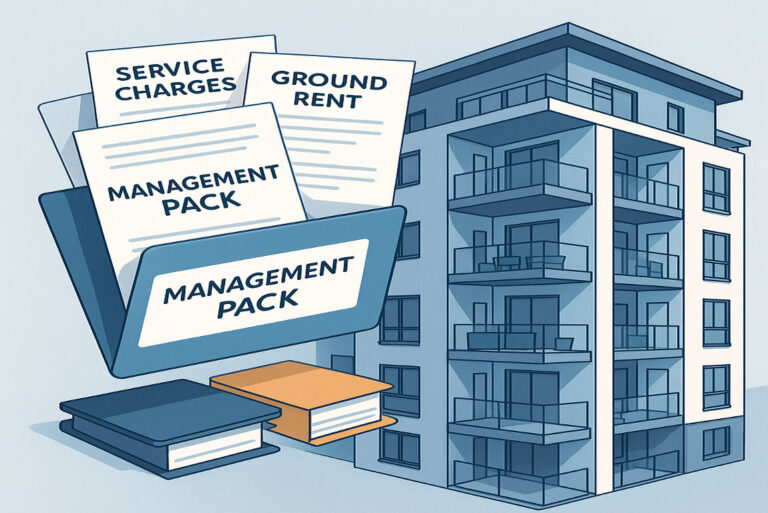Buying a house is an exciting milestone, but it can also be a complex and daunting process. Whether you’re a first-time buyer or have been through the process before, there are always new terms and legalities to navigate. One such term that often arises, especially when dealing with leasehold properties or managed estates, is the management pack.
What is a Management Pack?
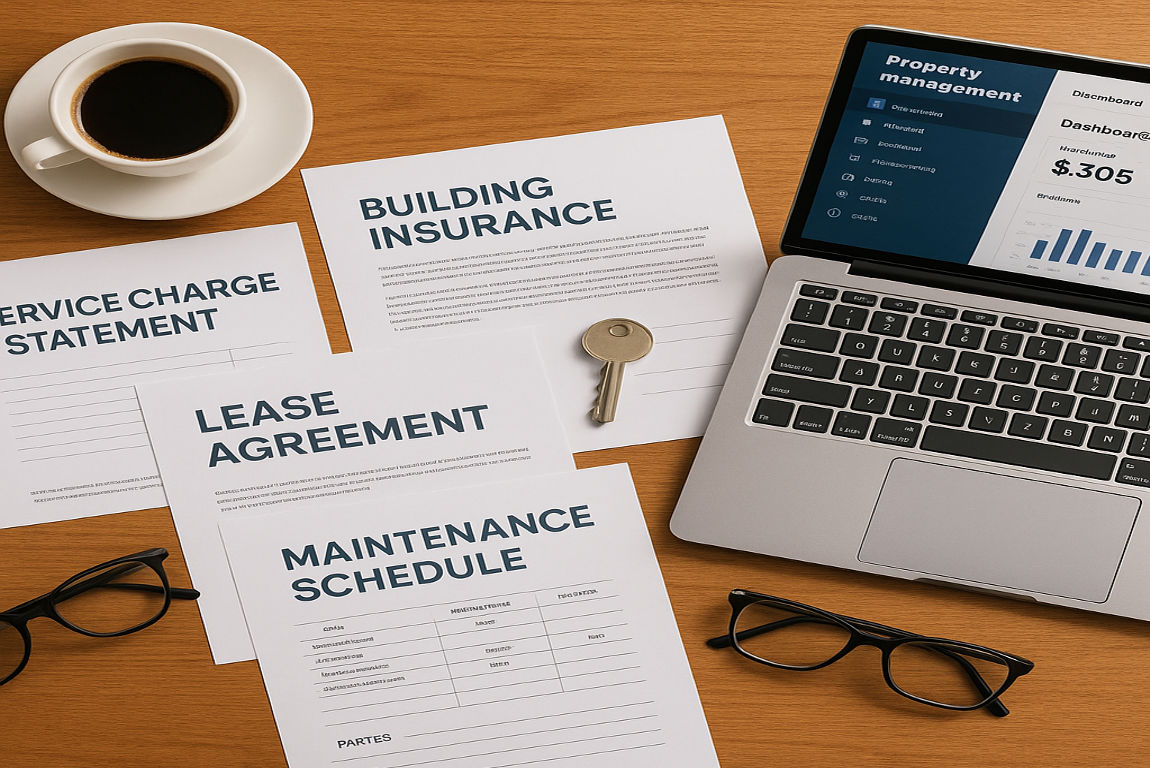
A management pack, sometimes referred to as a sales pack or leasehold information pack, is a collection of key documents and information related to the management of a property. It is most commonly required during the sale of leasehold properties or properties in managed freehold estates.
When and Why is a Management Pack Used?
A management pack is typically requested when selling a property that involves shared ownership responsibilities or communal areas. This is particularly relevant for:
- Leasehold properties: Flats or houses where you own the property for a fixed term but not the land it stands on.
- Managed freehold estates: Freehold homes that are part of estates with shared facilities, such as parking spaces, gardens, or private roads.
The pack is prepared by the managing agent, landlord, or management company, and it provides transparency about the property’s current and future management details. This ensures both the buyer and seller are aware of their rights and obligations regarding the property.
Why is it Necessary?
The management pack plays a critical role in property transactions. It provides buyers with essential insight into ongoing costs, shared responsibilities, and potential liabilities. Without it, buyers might face unexpected surprises—financial or otherwise—after the purchase.
In short, the management pack serves as a bridge between the buyer and seller, ensuring transparency and facilitating compliance with legal requirements.
Why is a Management Pack Important When Buying a House?
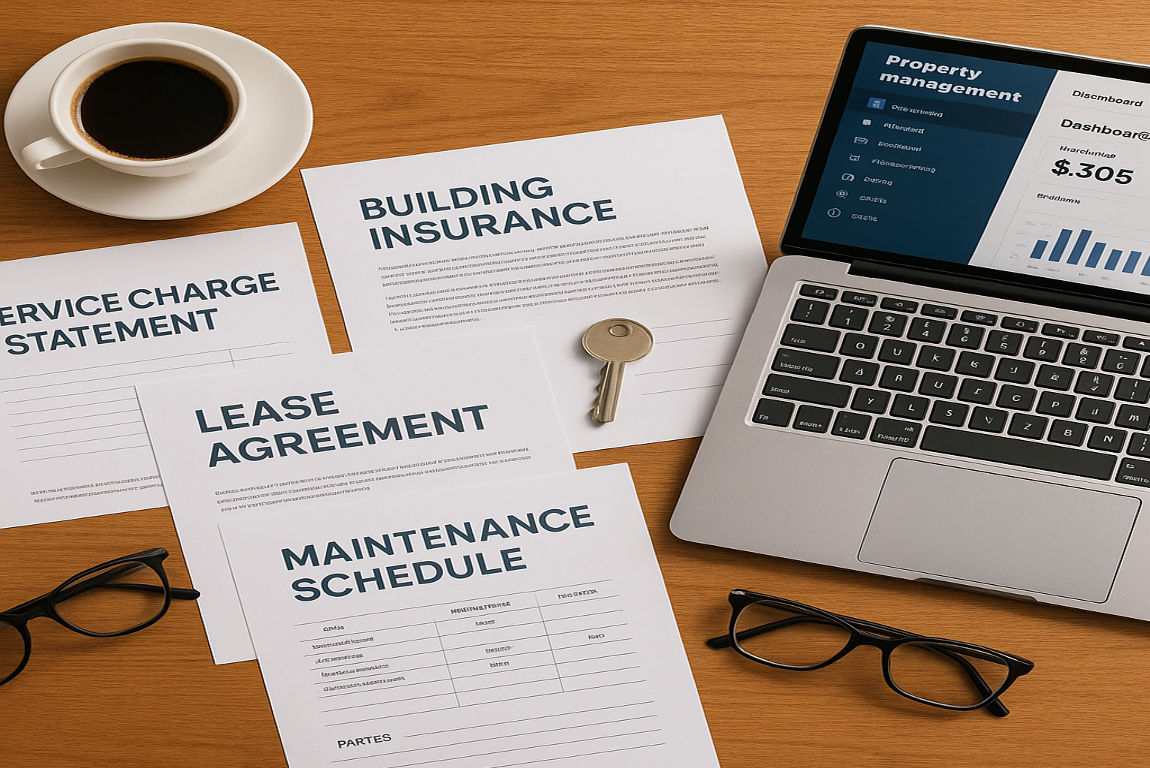
Purchasing a home is a significant financial commitment. A management pack ensures you have all the necessary information to make an informed decision. Let’s explore its importance in detail.
You may also read (discover the quality of bauhaus furniture for your home).
Ensures Transparency About Property Management
The management pack provides detailed information about how the property is managed, including:
- Who is responsible for maintenance and repairs.
- How communal areas are managed.
- Financial details, such as service charges and ground rent.
This transparency helps buyers fully understand what they’re purchasing.
Helps Buyers Budget for Ongoing Costs
One of the most critical aspects of the pack is its financial breakdown. It includes:
- Current service charges: These cover the maintenance of communal areas, including cleaning, landscaping, and security.
- Ground rent: This applies to leasehold properties and may increase over time.
- Potential future costs for major works: For example, repairs to the building structure or communal facilities.
Knowing these costs upfront helps buyers plan their budget and avoid financial surprises after the purchase.
Provides Legal and Conveyancing Benefits
The management pack is a legal requirement in many property transactions. By reviewing it, solicitors can ensure compliance with laws such as the Landlord and Tenant Act 1985. Additionally, having this document available early in the transaction can speed up the conveyancing process, helping to avoid delays.
Allows Buyers to Avoid Unexpected Costs
No one wants to be blindsided by unexpected fees. Reviewing the management pack carefully ensures buyers are aware of any:
- Planned major works (e.g., roof repairs or external renovations).
- Arrears in service charges that may need to be cleared by the seller.
- Compliance-related costs, such as fire safety improvements.
This knowledge provides peace of mind and helps prevent disputes after purchase.
What Does a Management Pack Typically Include?
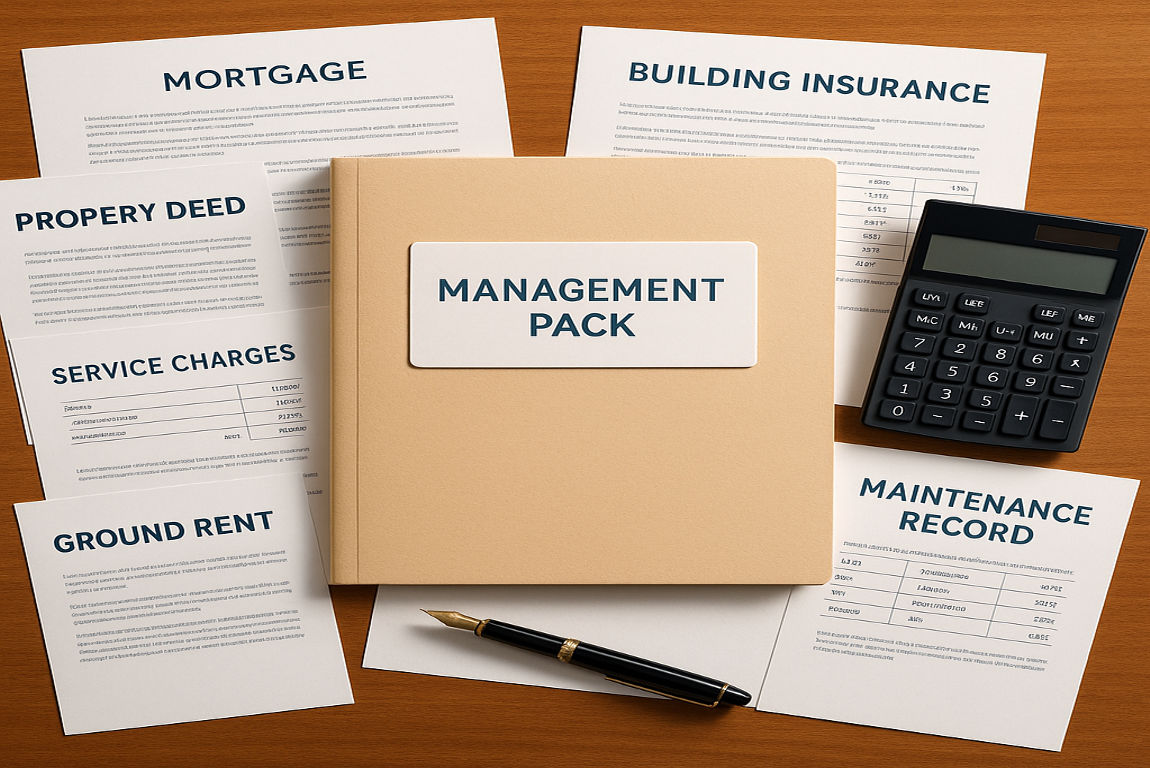
The management pack is a comprehensive document containing various elements. Each component provides specific insights into the property and its management. Below is a detailed breakdown of what you can expect to find.
LPE1 Form (Leasehold Property Enquiries) or FME1 Form (Freehold Management Enquiries)
These forms are central to the management pack. They outline key details such as:
- The property’s lease or freehold terms.
- Management company information.
- Ongoing charges and responsibilities.
Service Charge Information
- Current service charge amounts.
- Payment schedules.
- Budget breakdowns and historical accounts.
- Information on any service charge arrears.
You may also read (why do mice seek shelter in homes).
This section helps buyers understand the financial obligations associated with the property.
Ground Rent Details
For leasehold properties, this section outlines:
- Current ground rent.
- Payment dates.
- Planned increases (in line with the Leasehold Reform (Ground Rent) Act 2022).
Buildings Insurance
Details about the building insurance policy are included, covering:
- Policy provider.
- Coverage details.
- Costs and renewal dates.
Major Works Information
This section provides insight into any planned or ongoing major works, such as:
- External repairs or renovations.
- Estimated costs for these works.
- Potential disruptions for residents.
Management Company Information
Key details about the management company, including:
- Contact information.
- Financial accounts.
- Roles and responsibilities.
Fire Safety and Compliance Documents
This critical section includes documents like:
- Fire risk assessments.
- Asbestos surveys.
- Any compliance issues that need addressing.
Deed of Covenant and Notice Fees
These are fees payable when transferring ownership of the property. The management pack outlines:
- The amount of these fees.
- When and how they need to be paid.
Reserve Fund Statements
The reserve fund is money set aside for future major works. The pack should include:
- Current reserve fund balance.
- Contributions made by previous owners.
- Planned future contributions.
AGM Minutes
If the property is part of a residents’ association or management company, the pack may include recent meeting minutes. These provide insight into:
- Community decisions.
- Financial planning.
- Any disputes or issues raised.
Why Each Component Matters
Each document in the management pack serves a purpose. Together, they provide a comprehensive view of the property’s financial, legal, and operational standing. Buyers can use this information to assess their obligations and make an informed decision.
How to Review and Understand a Management Pack
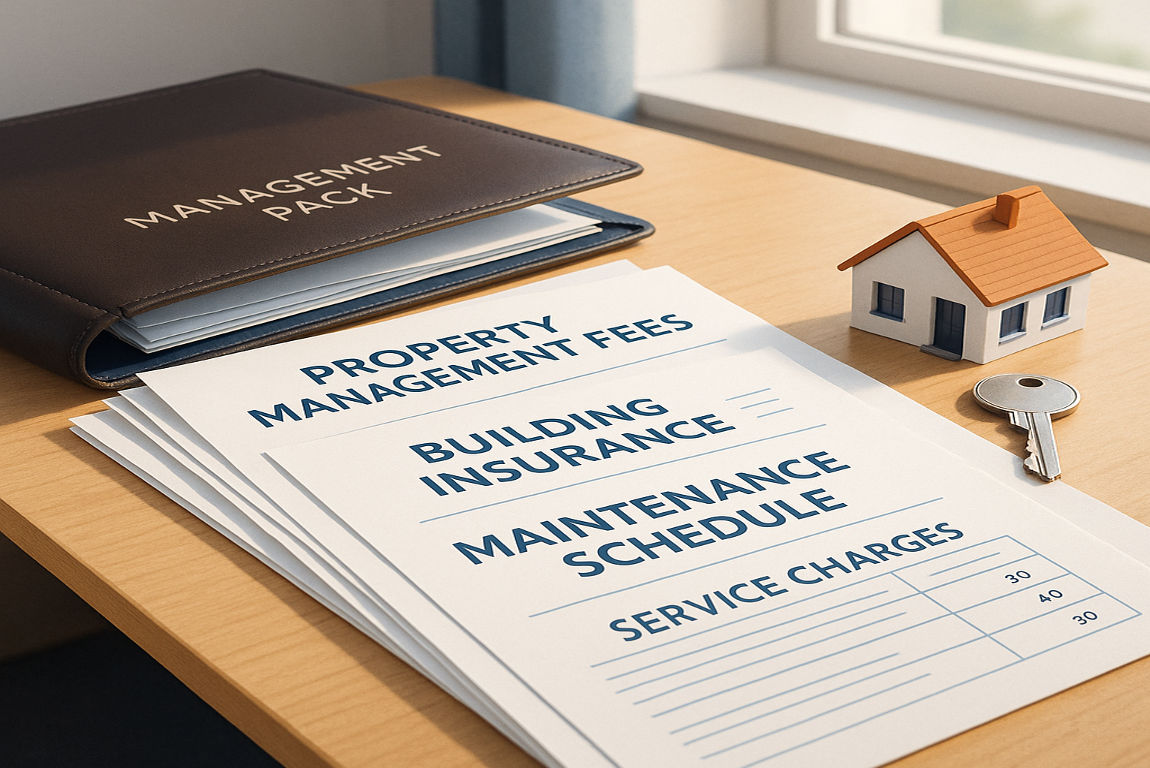
Reviewing a management pack can feel overwhelming, but it doesn’t have to be. Here’s a step-by-step guide to help you navigate it effectively.
Read the LPE1 or FME1 Form First
Please start with the LPE1 or FME1 form, as it provides a summary of the key details. Look for:
- Current service charges and arrears.
- Ground rent schedules.
- Contact details for the management company.
Check Financial Details
Pay close attention to the financial sections, including:
- Service charges.
- Reserve fund balances.
- Major work costs.
Ensure these align with your budget and expectations.
Look for Red Flags
Watch out for:
- High service charge arrears.
- Planned expensive works.
- Increasing ground rent.
Review Safety Documents
Ensure the property complies with fire safety and other regulations. Missing or outdated compliance documents could indicate potential risks.
Consult Your Solicitor
Your solicitor or conveyancer will help interpret the pack and flag any concerns. Don’t hesitate to ask questions or request clarifications from the management company.
Costs and Timelines Associated with Management Packs
Typical Costs
The cost of obtaining a management pack usually falls on the seller. Prices can range from £200 to £500, depending on the management company.
Timelines
On average, it takes 2-4 weeks to prepare a management pack. Delays can occur if:
- The management company is slow to respond.
- Documents are incomplete or outdated.
What If the Pack Is Delayed?
If the management pack is delayed, it can hold up the entire property transaction. Buyers should work closely with their solicitor to address any issues promptly and effectively.
Special Considerations for Freehold Properties and New Builds
Although management packs are more common for leasehold properties, they are also relevant for:
- Freehold properties in managed estates with shared facilities.
- New builds, where developers often include management arrangements for communal areas.
In these cases, the pack may focus more on shared maintenance obligations rather than lease terms.
Frequently Asked Questions (FAQs)
What Happens If a Management Pack Is Not Provided?
The transaction may be delayed, as the buyer and their solicitor cannot proceed without the necessary information.
Can a Buyer Proceed Without Reviewing the Management Pack?
While possible, it’s not advised. Missing this step could lead to unforeseen costs or legal disputes.
How Often Is a Management Pack Updated?
Management packs are typically updated when a property is sold or if there are significant changes in management or costs.
Are Management Packs Legally Required?
Yes, especially for leasehold properties. Sellers must provide this information to comply with legal obligations.
Who Is Responsible for Errors in the Pack?
The management company or landlord is usually responsible for any inaccuracies. Buyers should flag errors immediately.
You may also read (how to use net listings to maximize home value).

